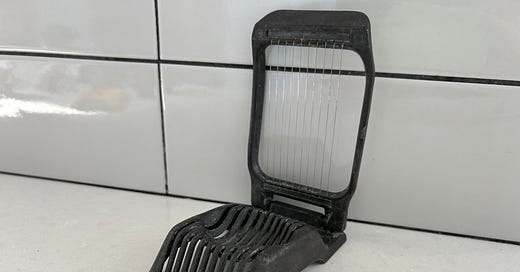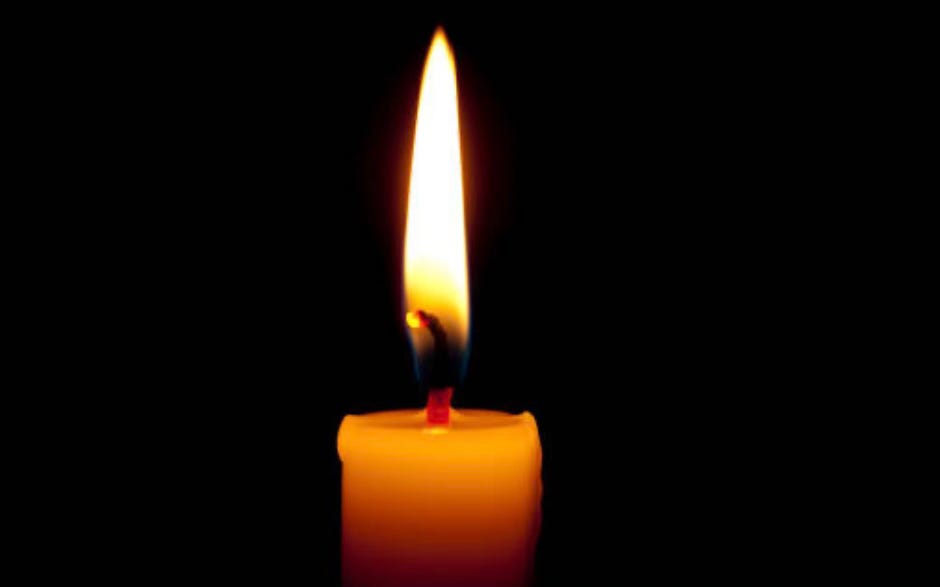My life bears no resemblance to what I heard about in a recent conversation with my friend Lana. Her mother, Hanna, and dad, Saul, lived through things I can hardly begin to fathom. And yet, I was so deeply moved by what Lana shared that I feel compelled to put words to it, even if the words fall short.
To me, stories like Hanna’s carry something essential – proof of the strength that lives quietly in us, and a reminder that courage can rise even in the darkest hours.
When I asked Lana to tell me about Passover, I expected some history of the holiday and stories of her Seder table, matzah, and brisket, and maybe a favorite family recipe or two.
What I didn’t expect was the egg slicer.
It’s small and unassuming – an old wire egg slicer with a simple hinge, its metal dulled from decades of use. But it’s something sacred passed along to Lana, and carries the memory of her mother’s journey to freedom.
“This,” Lana told me with a kind of reverence larger than the object itself, “came with my mom (Hanna) in 1950, to New York City.” Along with some china and a few other objects, this was one of the remaining possessions of her life.
There are many extraordinary details about Hanna’s life – growing up in Poland as the Nazi presence spread, the unimaginable danger she faced, the constant fear.
I can’t tell all of it here. But what I carry with me is this: Hanna was brave. She moved through terrifying moments with courage, hiding when she had to, and somehow managing to obtain papers that identified her as a “non-Jew.” Those papers undoubtedly allowed her to survive, while most of her family did not.
Lana knows only fragments of her parents’ past because they lived their lives quietly, choosing not to speak of what came before.
What she does know is that her mom had survived the concentration camps, then passed through the gray, in-between world of a “displaced persons” camp in Germany - a GP camp, they called it (as if initials could tidy up the horror). Eventually, set up in an apartment, she met Saul (also a survivor). She had already lost her young activist husband, shot in the forest as war was spreading through Poland.
After only a few weeks of knowing Saul, she agreed to marry him and go to America for a new start.
She carried with her the egg slicer.
At Passover, the egg plays a role that is both symbolic and nourishing. It represents new life and resilience after destruction. It’s also one of the simplest things one can eat, yet the role it plays at Lana’s Seder table transforms it into a ritual of remembrance.
Each year, as Lana slices the eggs for her Seder, she uses Hanna’s slicer. It’s now a bridge from unspeakable details to the sanctity of tradition. Holding the presence of a woman gone but deeply felt.
When Lana spoke to me of Passover, she spoke not just of Exodus, but of all exiles –physical and spiritual, historical and contemporary – yes – but also of the quiet ways we carry memory forward. Not just in books or ceremonies, but in the tools we use, the meals we make, and the questions we ask, all of which can fuel our liberation.
And though the tradition is not mine by heritage, its meaning is now etched into my heart. And, when I think of Passover, I think of Hanna’s egg slicer. Not fancy, not flashy. Just enduring. A little instrument of grace, cutting through time, symbolizing an act of starting over.
And so, I come full circle – back to the power of food, and tradition and ritual as a way to hold one another close, to speak love without words.
Lana is an excellent cook, and in the spirit of Passover and the tradition it carries, she has shared a family recipe with me. I would love to pass it to you.
Wherever you are and however you gather, may your table be blessed.





